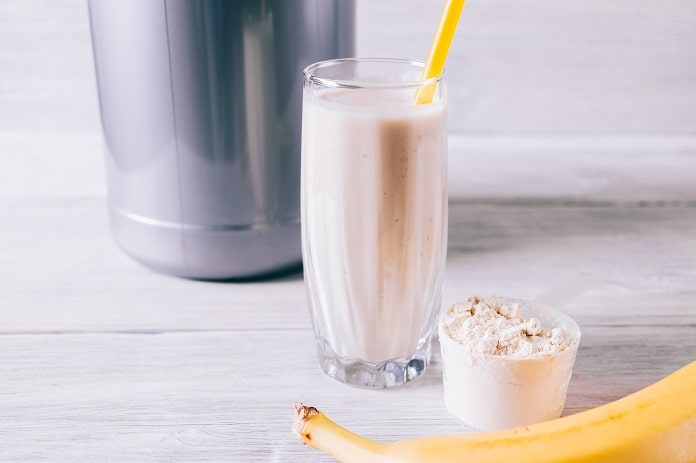A recent study published in LWT – Food Science and Technology discussed how the quality of protein powder supplements can change during their manufacture and storage.
Dietary supplements are becoming increasingly popular among amateur and professional athletes.
These supplements are used for a variety of health reasons including weight loss, muscle building, strength enhancement, and more. Sports supplements such as protein powder are the most commonly used dietary supplements, especially among gym-enthusiasts.
Athletes use protein powder supplements to support nutritional needs and maximize performance while training or competing.
Protein powders aim to support muscle development
Protein is an essential nutrient for developing and maintaining tissue such as muscle.
Protein powders aim to support muscle development in the body. Powders are typically based on whey and casein proteins, though other plant and animal sources exist.
Most protein powders are heated or filtered during the manufacturing process to separate and concentrate the protein. Powders are then dried before being placed into storage. Heating proteins can cause them to denature, or break down, making them inactive.
This process has led to some dispute on the claims made by manufacturers of these products.
A recent study led by A.J. Sánchez-Oliver and colleagues of the University of Seville in Spain discussed how the manufacture and storage of protein powders affect their nutritional content.
Lysine, an essential amino acid, must be obtained from dietary sources
The authors looked at 52 commercial protein powder supplements for the study. The samples reflected all protein types available on the market. They analyzed each sample for its “blocked lysine” content, representing a form of lysine that the human body is unable to use.
To do this, the authors calculated the furosine and total lysine content of each powder.
Lysine is an amino acid (protein building block) that is essential for proper growth and development. It is not produced naturally in the body and must be obtained through dietary sources or supplements.
Heat treatment in manufactured protein powder supplements may affect lysine content
Furosine is commonly used as a marker to measure how heat-treatment affects the nutritional content of dairy products.
Higher furosine content means that the item has been treated more heavily with heat, and has less active lysine available. By analyzing the amounts of furosine and total lysine, the team determined how much “blocked” lysine was in each sample.
Whey hydrolysates had the highest amount of heat damage
The results – published in LWT Food Science and Technology – showed that half of the protein powders tested had over 6% blocked lysine content, while only 9% of samples contained more than 20% blocked lysine.
Whey hydrolysates and peptides had the highest amount of heat damage, with an average of 12% blocked lysine content; whey isolates and caseins had the lowest blocked lysine content.
The authors also noted that supplements with a higher protein content had a lower amount of carbohydrates (sugars), indicating less heat damage.
They concluded that carbohydrate value can be used to indirectly measure how much of the product was damaged by heat during manufacturing.
This research provides insight into how manufacturing and storage of food products may alter their nutritional value.
Although protein powder supplements are safe for consumption, dietary plans should consider how much of a product’s nutritional content is actually available to the body.
Further research into other supplements and food items can help improve the accuracy of food labeling and nutritional claims for consumers.
Written by Braydon Black, BSc
References:
- Sánchez-Oliver AJ, Contreras-Calderón J, Puya-Braza JM, Guerra-Hernández E. Quality analysis of commercial protein powder supplements and relation to characteristics declared by manufacturer. LWT – Food and Science Technology. 2018 Jun;97:100-108.
- American Association for the Advancement of Science. The quality of protein supplements for sportspeople [press release] (25 Sep 2018) [cited 2018 Oct 5]. Available from: https://www.eurekalert.org/pub_releases/2018-09/uos-tqo092518.php
- National Health Service. Bodybuilding and sports supplements: the facts [Internet]. London: The Service [cited 2018 October 5]. Available from: https://www.nhs.uk/live-well/healthy-body/body-building-sports-supplements-facts/
- Icahn School of Medicine at Mount Sinai. Lysine [Internet]. New York: Mount Sinai Hospital; [cited 2018 October 5]. Available from: https://www.mountsinai.org/health-library/supplement/lysine
- Ritota M, Di Costanzo MG, Mattera M, Manzi P. New trends for the evaluation of heat treatments of milk. Journal of Analytical Methods in Chemistry [Internet]. 2017 Nov [cited October 5 2018];v.2017. Available from: https://www.ncbi.nlm.nih.gov/pmc/articles/PMC5688360/. DOI: 10.1155/2017/1864832.



